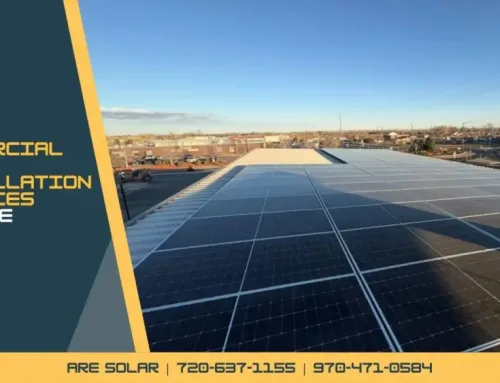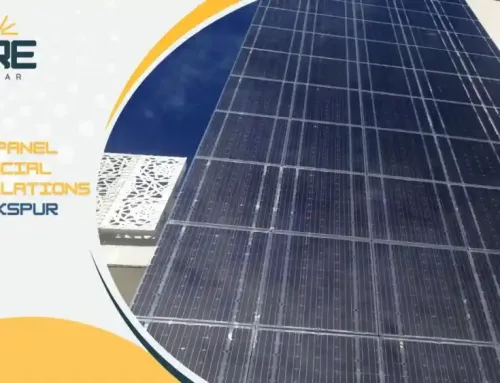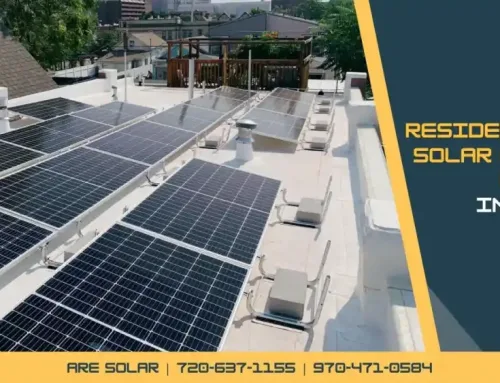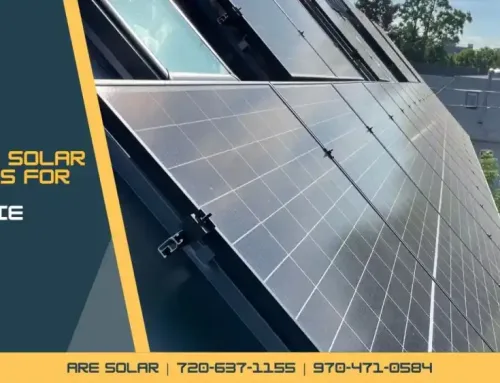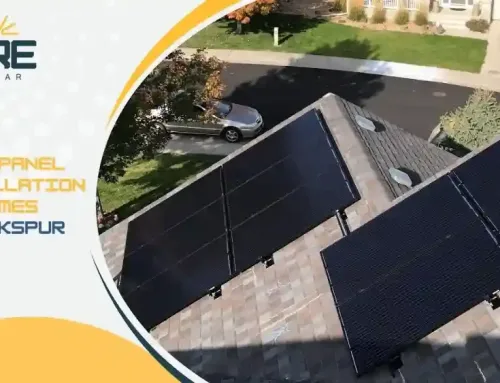ARE Solar explains how solar panels work so homeowners understand how their residential solar panel installation works and will help their homes obtain clean energy.
– Solar panels capture sunlight and convert it into electricity.
– The efficiency of solar panels can be affected by factors such as temperature, shading, and dirt.
– Solar energy is a clean and renewable source of zero greenhouse gas emissions.
– Solar panels cut down monthly utility expenses and can increase property value.
The importance of solar energy in residential settings cannot be overstated. With rising concerns about climate change and the depletion of traditional energy resources, transitioning to renewable energy sources like solar power has become imperative. Residential solar panel installation allows homeowners to reduce their carbon footprint, lower energy bills, and achieve energy independence. Solar panels have revolutionized how we generate electricity by harnessing the power of sunlight. But have you ever wondered how exactly these panels work? In this blog post, ARE Solar explores the world of solar energy and the intricate mechanisms behind solar panels.
ARE Solar in Denver is an experienced residential solar panel installation company. We install high-performing solar panel systems that help you harness the sun’s power to provide your household with electrical energy. Our solar panel installation professionals deliver solar energy systems tailored to your needs and maximize your savings. We are a residential solar panel company that uses state-of-the-art equipment, high-quality manufacturers, industry-leading warranties, trained and certified professionals, and competitive pricing while delivering solar solutions that cater to the needs of our clients.
By understanding the science and technology behind solar panels, we can uncover their efficiency and performance secrets. If you’re curious to learn how sunlight is converted into electricity and how solar panels contribute to a greener future, join us as we peek into the captivating world of solar panel technology.
Understanding Solar Panels
To fully understand solar panels, it is essential to grasp the science behind their operation. Solar panels harness the energy from sunlight and convert it into usable electricity through a series of complex processes. These processes involve the absorption of photons, the excitation of electrons, the generation of electric current, and the conversion of this current into a form that can be used to power homes and businesses.
The Science of Solar Panels
Solar panels, which capture sunlight and convert it into electricity through a combination of science and technology, play a crucial role in harnessing renewable energy. When it comes to residential solar panel installation, it is important to work with a reputable residential solar panel company, such as ARE Solar in Denver. The science behind solar panels involves several key steps. First, the panels absorb photons from sunlight, which excite the electrons in the panel’s semiconductor material. This creates an electric current. The direct current (DC) generated by the panels is then converted into alternating current (AC) by an inverter. Finally, the AC electricity is connected to the power grid or used by the home. Understanding the science of solar panels is essential for maximizing their efficiency and reaping the benefits of renewable energy.
Types of Solar Panels
When it comes to solar panels, there are three main types to consider: monocrystalline, polycrystalline, and thin-film. Monocrystalline panels are known for their high efficiency, but they come at a higher cost. Polycrystalline panels are more affordable but slightly less efficient. Thin-film panels, on the other hand, are flexible and suitable for unconventional mounting surfaces. Each type of solar panel has its own advantages and considerations, making it important to choose the one that best fits your budget, available space, aesthetics, and energy needs.
Monocrystalline Solar Panels
Monocrystalline solar panels stand out as a top choice for homeowners seeking superior efficiency and long-term performance. These panels are made from a single crystal structure, which gives them a uniform appearance. The manufacturing process involves cutting thin wafers from a single silicon ingot, resulting in a higher efficiency rate than other types of solar panels. Monocrystalline panels have a higher power output and are more efficient in converting sunlight into electricity. They also tend to perform better in low-light conditions. However, these panels are generally more expensive than other options. Despite the higher cost, homeowners often choose monocrystalline solar panels for their higher efficiency, durability, and aesthetic appeal.
Polycrystalline Solar Panels
Another option to consider for homeowners is the use of polycrystalline solar panels. Polycrystalline solar panels are made from multiple silicon crystals, which are melted together to form a single panel. This manufacturing process makes them less expensive to produce compared to monocrystalline panels. However, the trade-off is slightly lower efficiency. Polycrystalline panels typically have an efficiency range of 15-17%, which is still quite good for residential solar installations. These panels are also recognizable by their blue color due to how the silicon crystals reflect light. Polycrystalline solar panels are popular for homeowners looking for a cost-effective and reliable solution to meet their energy needs.
Thin-Film Solar Panels
Thin-film solar panels are a type of solar panel that offer flexibility and are suitable for unconventional mounting surfaces. Unlike traditional solar panels, made from crystalline silicon, thin-film panels are made by depositing a thin layer of photovoltaic material onto a substrate, such as glass or metal. This manufacturing process allows for greater flexibility, making thin-film panels ideal for curved or irregular surfaces. Additionally, thin-film panels are lighter and thinner than other solar panels, making them easier to transport and install. However, they are generally less efficient than crystalline silicon panels, meaning more surface area is required to generate the same amount of electricity.
The Process of Residential Solar Panel Installation
Residential solar panel installation involves a series of carefully planned steps to ensure the efficient and effective conversion of sunlight into usable electricity. The process begins with a thorough site assessment to determine the optimal placement of the solar panels. Factors such as sun exposure, shading, and available space are considered during this assessment. Once the site is deemed suitable, the appropriate type of solar panels is selected based on efficiency and cost considerations.
Next, the solar panels are securely mounted onto the roof using sturdy brackets. This ensures they are positioned at the correct angle and orientation to maximize sunlight absorption. An inverter is then installed, which plays a crucial role in converting the direct current (DC) electricity generated by the solar panels into alternating current (AC) electricity that can be used to power household appliances and electronics.
After the installation is complete, the solar system is activated and connected to the power grid. This allows any excess electricity generated by the solar panels to be fed back into the grid, earning credits that can be used during times when the solar system is not producing enough electricity, such as at night or during cloudy days. Monitoring systems are also set up to track the performance and efficiency of the solar panels.
Regular maintenance, including cleaning and inspection, is important to optimize the performance of the solar panels. Factors such as temperature, shading, and dirt can affect their efficiency. However, even on cloudy days, solar panels can still generate electricity.
Residential Solar Panel Performance
Several factors come into play when it comes to residential solar panel performance. The geographical location of the installation affects the amount of sunlight the panels receive, while the optimal angle of the panels determines their efficiency. Additionally, weather conditions such as temperature and shading can impact the performance of solar panels. Understanding and optimizing these factors is key to maximizing the energy production of residential solar systems.
Geographical Location
The geographical location influences solar panel performance in residential settings. The amount of sunlight that reaches solar panels varies depending on latitude, climate, and local weather patterns. For example, regions closer to the equator receive more direct sunlight throughout the year, resulting in higher solar panel output. Additionally, areas with fewer cloudy days and less shade from surrounding buildings or trees tend to have better solar panel performance. Homeowners must consider their location when installing solar panels to ensure optimal energy production. Conducting a site assessment and consulting with a residential solar panel company can help determine the suitability of a residential location for solar panel installation.
Optimal Angle of Solar Panels
To ensure optimal performance of solar panels in residential settings, careful consideration must be given to the angle at which they are installed. The angle, also known as the tilt, determines the amount of sunlight the panels can capture. The optimal angle varies depending on the geographical location of the installation and the time of year. In general, solar panels should be tilted at an angle equal to the latitude of the location to maximize energy production throughout the year. However, adjustments can be made to optimize performance during specific seasons. For example, in winter months, a steeper tilt can help capture more sunlight at a lower angle. Regular monitoring and adjusting the panel’s tilt can ensure they are always positioned optimally to generate the maximum amount of electricity.
Weather Conditions
Various weather conditions influence residential solar panel performance. While solar panels can still generate electricity on cloudy days, their efficiency is reduced compared to sunny conditions. This is because clouds block a significant portion of sunlight, limiting the energy the panels can absorb. Similarly, rain can negatively impact solar panel performance as it reduces the amount of sunlight reaching the panels. On the other hand, cooler temperatures can improve the efficiency of solar panels, as they operate more efficiently in lower temperatures. However, extreme hot or cold temperatures can potentially damage the panels over time. Therefore, it is important to consider these weather conditions when assessing the performance and output of residential solar panels.
The Environmental Impact Of Solar Panels
The production and use of solar panels have a significant environmental impact, which must be considered alongside their benefits. While solar energy is a clean and renewable power source, the manufacturing process of solar panels has some environmental consequences. The production of solar panels requires energy consumption and can generate waste. The manufacturing process involves using materials such as silicon, glass, and metals, which require energy-intensive extraction and processing. Additionally, the production of solar panels can result in the emission of greenhouse gases and other pollutants.
However, it is important to note that the environmental benefits of solar energy far outweigh these impacts over the panels’ lifetime. Solar energy reduces reliance on fossil fuels, major contributors to climate change and air pollution. By harnessing the sun’s power, solar panels help mitigate greenhouse gas emissions and contribute to a more sustainable and greener future. Moreover, using solar energy helps conserve natural resources and reduces the need for destructive mining practices associated with fossil fuel extraction.
Furthermore, advancements in solar panel technology and manufacturing processes are continually being made to minimize the environmental impact. Companies are working towards using more environmentally friendly materials and improving the energy efficiency of solar panels. Additionally, the recycling and proper disposal of solar panels at the end of their life cycle are being addressed to reduce waste and promote a circular economy. ARE Solar is an environmentally responsible residential solar panel company in Denver that ensures we dispose of solar panels that are no longer useful as mandated by authorities and regulatory bodies.
The Financial Impact of Residential Solar Panel Installation
Installing residential solar panels can have a significant financial impact, providing long-term savings on energy costs and increasing the value of the property. By harnessing the power of the sun, homeowners can reduce their dependence on traditional electricity sources and generate their own clean, renewable energy.
One of the key financial benefits of residential solar panel installation is the potential for long-term savings on energy costs. Homeowners can generate electricity once the solar panels are installed, reducing or eliminating their monthly utility bills. This can lead to substantial savings over the lifespan of the solar panels, which can range from 25 to 30 years. Additionally, as utility rates continue to rise, homeowners with solar panels can protect themselves against future increases.
Another financial advantage of residential solar panel installation is the potential increase in property value. Studies have shown that homes equipped with solar panels tend to sell at a higher price than comparable homes without solar panels. This is because potential buyers recognize the value of having a sustainable and energy-efficient home. Moreover, solar panels can make a property more attractive to environmentally conscious buyers.
Furthermore, federal tax credits and state incentives can help reduce the initial investment in installing solar panels. These financial incentives can offset a portion of the installation costs, making solar panel installation more affordable for homeowners.
ARE Solar has a documented track record of providing professional and reliable residential solar panel installation services for more than ten years. Our custom-designed solar panel systems are cost-efficient and carry industry-leading manufacturer guarantees. We can also help you take advantage of available rebates and tax credit opportunities.
Frequently Asked Questions
1. Can solar panels work at night or in cloudy weather?
Solar panels cannot generate electricity at night since they rely on sunlight to function. However, solar panels can still generate electricity on cloudy days.
2. How long do solar panels typically last?
Solar panels typically last 25 to 30 years, although some can continue operating even after that. Quality, maintenance, and environmental conditions can affect their lifespan. Regular inspection and proper care can maximize their longevity.
3. Are solar panels noisy, or do they produce any sound?
Solar panels do not produce any sound as they convert sunlight into electricity. They operate silently, making them an ideal choice for residential and commercial applications where noise pollution is a concern.
4. Can solar panels be installed on any roof type?
Solar panels can be installed on most types of roofs, including flat, pitched, and curved. Factors such as orientation, shading, and structural integrity should be considered. A professional assessment is recommended to determine the suitability and optimize energy production.
5. What happens to solar panels during a power outage?
Solar panels alone cannot provide electricity to a home or building during a power outage. This is because grid-connected solar systems are designed to automatically shut off during an outage to prevent sending electricity back into the grid and endangering utility workers.
Residential Solar Panel Installation from ARE Solar for Sustainable Homes
Solar panels are a reliable and efficient solution for generating electricity from sunlight. They capture sunlight and convert it into electricity through scientific principles and technological advancements. There are different types of solar panels, each with advantages and considerations. The installation process involves:
- Selecting the right panels.
- Mounting them securely.
- Installing an inverter.
- Connecting the system to the power grid.
Monitoring the performance and optimizing the efficiency of solar panels is crucial for maximizing their benefits. Additionally, understanding solar panel installations’ environmental and financial impact is important for making informed decisions.
Embracing solar power is not just a choice; it’s a commitment to sustainable living and a brighter future for future generations. As your premier residential solar panel company in Denver, CO, ARE Solar is passionate about empowering homeowners to take control of their energy consumption and reduce their environmental impact through solar panel installation. By harnessing the sun’s abundant energy, residential solar panels offer a pathway to energy independence, cost savings, and environmental stewardship. As we’ve explored throughout this guide, the workings of solar panels are rooted in simplicity yet yield profound benefits for both homeowners and the planet.
Encouraging action towards renewable energy adoption is more than just a call to action; it’s a collective responsibility to prioritize sustainability and mitigate the effects of climate change. With each residential solar panel installation, we take a step closer to building a cleaner, greener future for our communities. As you consider the possibilities of solar energy for your home, remember that ARE Solar is here to guide you every step of the way. From initial consultation to expert installation and ongoing support, we’re committed to delivering exceptional service and empowering you to make a positive impact through renewable energy. Join us in embracing solar power, and together, let’s illuminate a sustainable path forward for our planet. Contact ARE Solar, your trusted residential solar panel company in Denver, CO, at (720) 706-2773 or aresolardenver@gmail.com for solar panel installation.



